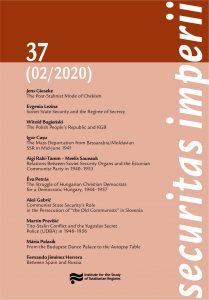Tito-Stalin conflict and the Yugoslav Secret Police (UDBA) in 1948–1956
Tito-Stalin conflict and the Yugoslav Secret Police (UDBA) in 1948–1956
Author(s): Martin PrevišićSubject(s): History of Communism
Published by: Ústav pro studium totalitních režimů
Keywords: Yugoslavia; Tito-Stalin Split 1948; Yugoslav Cominformists; Yugoslav State security service; Yugoslav repression against Cominformists; Goli otok; Prison camps;
Summary/Abstract: The paper deals with the Yugoslav secret police (Uprava državne bezbednosti, UDBA) during the Tito-Stalin split. From its beginnings, the Yugoslav secret police organization was one of the pillars of the newly established communist rule in Yugoslavia. Among other things, it played a crucial role in the fight against World War II’s remaining enemies. In addition, the UDBA had an essential role in the “class struggle” and sovietization of Yugoslavia. With the Tito-Stalin split in 1948, the UDBA served as the principal force for quelling Stalin supporters (ibeovci) and running and establishing a prison and labour camp system used for the incarceration of ibeovci. Labour camps, run by the UDBA, become notorious since systematic beatings and torture were used as the primary method in so-called “political re-education” of Stalin supporters. As many as 15,700 were imprisoned in one of the many labour camps (Goli Otok was the biggest). After the end of the Tito-Stalin split, the UDBA’s power grew even more until it was reorganized in 1966.
Journal: Securitas imperii
- Issue Year: 2020
- Issue No: 37
- Page Range: 154-164
- Page Count: 11
- Language: English

